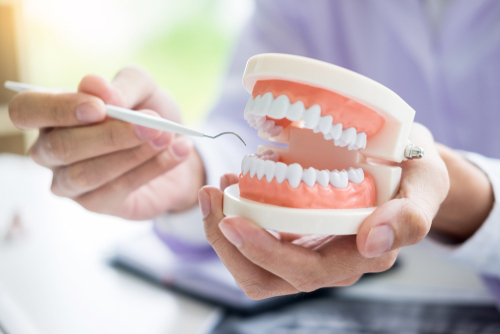
What Are the Symptoms of Serious Dental Problems?
July 18, 2023
Top Tips for Maintaining Your Dental Implants
August 1, 2023Solutions for Dealing with Tooth Sensitivity

Solutions for Dealing with Tooth Sensitivity
Solutions for Dealing with Tooth Sensitivity. Tooth sensitivity, medically known as “dentin hypersensitivity,” is a common dental problem characterized by discomfort or pain in the teeth when encountering certain substances or temperatures.
Affecting nearly 1 in 3 people, tooth sensitivity can significantly hamper a person’s quality of life, impacting dietary choices and self-esteem.
This article explores the causes, symptoms, home remedies, professional treatments, and preventative measures for tooth sensitivity.
Understanding Tooth Sensitivity
Table of Contents
Tooth sensitivity occurs when the tooth’s dentin, the layer beneath the enamel, becomes exposed, causing discomfort or sharp, sudden pain when eating hot or cold foods or brushing or flossing.
Common causes include worn tooth enamel, tooth decay, worn fillings, fractured teeth, gum disease, and exposed tooth roots.
A sensitive tooth exposes the dentin, which contains microscopic tubules filled with nerve endings, thus causing discomfort.
Home Remedies for Tooth Sensitivity
- Avoid acidic foods and drinks like citrus fruits and sodas, as they can erode tooth enamel, leading to sensitivity.
- Maintaining good oral hygiene is key. Brushing and flossing regularly can help prevent conditions that contribute to sensitivity.
- Desensitizing toothpaste and fluoride mouth rinses can help block the transmission of sensation from the tooth surface to the nerve, thereby reducing sensitivity.
Professional Dental Treatments

If tooth sensitivity persists for more than a week, it’s recommended to consult a dentist for professional treatment.
Dentists can offer fluoride treatments, cover exposed roots through bonding, or use crowns or inlays to correct a flaw or decay-causing sensitivity.
While professional treatments can be highly effective, they can be more expensive than home remedies and may require multiple visits.
Choosing the Right Toothpaste for Sensitive Teeth
They can help to block the transmission of sensation from the tooth’s surface to the nerve. For maximum benefits, don’t rinse immediately after brushing; let the toothpaste sit on your teeth for a few minutes.
The Impact of Lifestyle on Tooth Sensitivity
- Smoking and excessive drinking can damage tooth enamel, leading to increased sensitivity.
- Stress can lead to teeth grinding, enamel wear, and tooth sensitivity. Proper sleep aids in overall physical and oral health.
- Healthy habits like regular exercise, a balanced diet, and adequate hydration can promote better oral health and reduce tooth sensitivity.
Prevention: Best Practices to Avoid Tooth Sensitivity
- Regular dental check-ups allow for early detection and treatment of conditions that may lead to sensitivity.
- A balanced diet rich in vitamins and minerals can help maintain strong and healthy teeth.
- Brushing with a soft-bristled toothbrush and fluoride toothpaste and flossing daily can help prevent tooth sensitivity.
The Connection Between Tooth Sensitivity and Other Dental Problems

- Tooth sensitivity may indicate underlying dental issues like cavities, a cracked tooth, or gum disease, requiring immediate attention.
- Dental procedures can temporarily cause sensitivity. If it persists, it may indicate infection or other problems.
- A dental professional should address persistent tooth sensitivity to rule out or treat complex dental health issues.
FAQs
Why Does Cold or Hot Food Cause Tooth Sensitivity?
Hot or cold temperatures can trigger nerves in the exposed dentin, causing a sudden, sharp pain.
Can Tooth Sensitivity Go Away on Its Own?
Mild tooth sensitivity can sometimes improve on its own with good oral hygiene and use of desensitizing toothpaste.
Are There Any Natural Remedies for Tooth Sensitivity?
Natural remedies include using a saltwater rinse, green tea as a mouthwash, and a honey and warm water rinse.
How Long Does It Take for Sensitivity Toothpaste to Work?
It generally takes a few weeks of regular use for sensitive toothpaste to relieve discomfort.
Solutions for Dealing with Tooth Sensitivity – Conclusion

Managing tooth sensitivity requires understanding its causes, maintaining good oral hygiene, using appropriate toothpaste, and seeking professional treatment when necessary.
Tooth sensitivity can indicate a more serious underlying dental problem. It’s important to take any persistent tooth discomfort seriously.
Taking a proactive approach to your oral health can prevent tooth sensitivity and protect your overall health. Remember, the best treatment is always prevention.
Are you suffering from tooth sensitivity? Don’t let it control your life. Seek professional help and adopt healthy oral habits to maintain a confident and comfortable smile. Contact us today!




